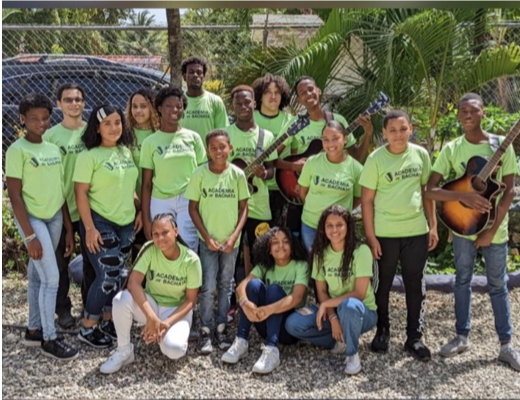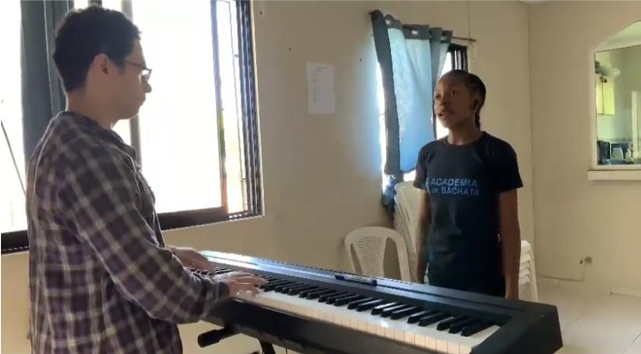Striking a Chord with Dominican Students in a Dominican NGO
Demmanuel with some of the Bachata Academy students
As a musician, I’ve had to take a lot of risks, and it’s been my goal to prepare my students to face their own. Not only does music require a certain level of skill and practice in order to perfect your craft, but a musician must also be willing to put themselves in very vulnerable situations. When performing a piece of music, you are in command of words and sounds that elicit and shape emotional energy, and this responsibility can oftentimes be rather daunting. Whether it be practicing in front of your professor or performing in front of an audience of people, these emotional demands can force a musician into very scary positions in which they have to interact with feelings they might not be ready for. Young students, or young musicians as I like to call them, have to be especially vulnerable in this setting.
Giving a Voice to Dominican Students
Demmanuel teaching piano at the Bachata Academy
Deciding to move to the Dominican Republic and work with the DREAM Project’s Bachata Academy to teach music has definitely been one of the most challenging yet rewarding decisions. Still, even having little to no idea what was waiting for me, I felt comfortable making that choice, because I was clear of my desires, abilities and limitations. I cannot say the same for my students and their understanding of themselves. I teach music theory, piano and voice, but where I can say that this struggle mostly takes place is in my voice lessons.
I’ve often argued how our voice is the most emotionally demanding instrument, because our voices are physically connected to our bodies. I always tell my students that they have only one voice, and that theirs is unlike anybody else's. Hence, a learning outcome in my singing classes is to learn about yourself as much as we learn how to sing. Through these understandings, my classroom takes shape. Instead of looking at my students’ vocal characteristics to see where they rank, I am constantly assessing who my students are; are they funny? are they kind? are they usually shy or scared? are they smart? are they musical? To me, a good musician is not just someone who plays and sings really well, but also someone who can effectively express their genuine self. In this way, discovering who they are and finding their strengths and weaknesses is the key to helping my students grow as a musician.
I refer to Garner’s Theory of Multiple Intelligences (though it is criticized by modern psychologists) to show how music and the person often interact, and how they can oftentimes become one. For instance, some of my students are really good at musical expression but have a hard time tuning. For others, they may tune very well but sing very mechanically. Still, others will sing in tune and express themselves well, but their tone and pronunciation of vowels will need more work.
One of the biggest honors of being a teacher is being part of the achievements of my students. I have worked with multiple students who, before meeting me, were terrified to sing in front of audiences. Now, many of them have sung in front of hundreds of people so far. Additionally, many of them were not able or willing to sing any louder than a whisper, and, nowadays, they are discovering just how powerful their voices can be. These accomplishments could only be possible through taking those risks, and I always make sure I prepare my students for them and that I have their back when they are pulling through.
About the Author: Demmanuel Gonzalez, Bachata Academy Fellow
Demmanuel Gonzalez is a 22-year-old Dominican-American from Clifton, New Jersey. He graduated with his Bachelor’s in Vocal Music Education from Washington and Lee University in Lexington, Virginia, where he studied piano, voice, choral conducting, music education, as well as psychology.



